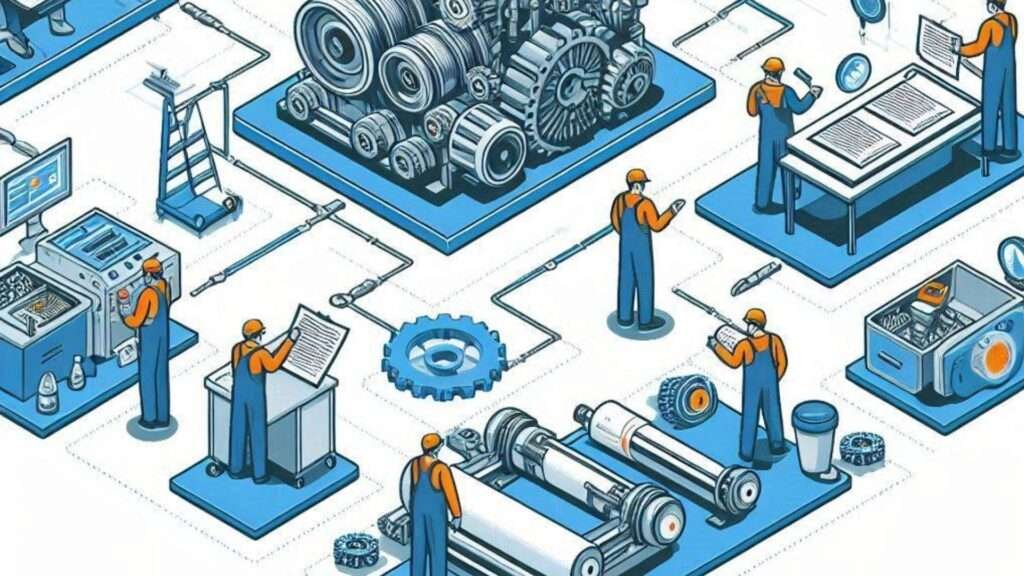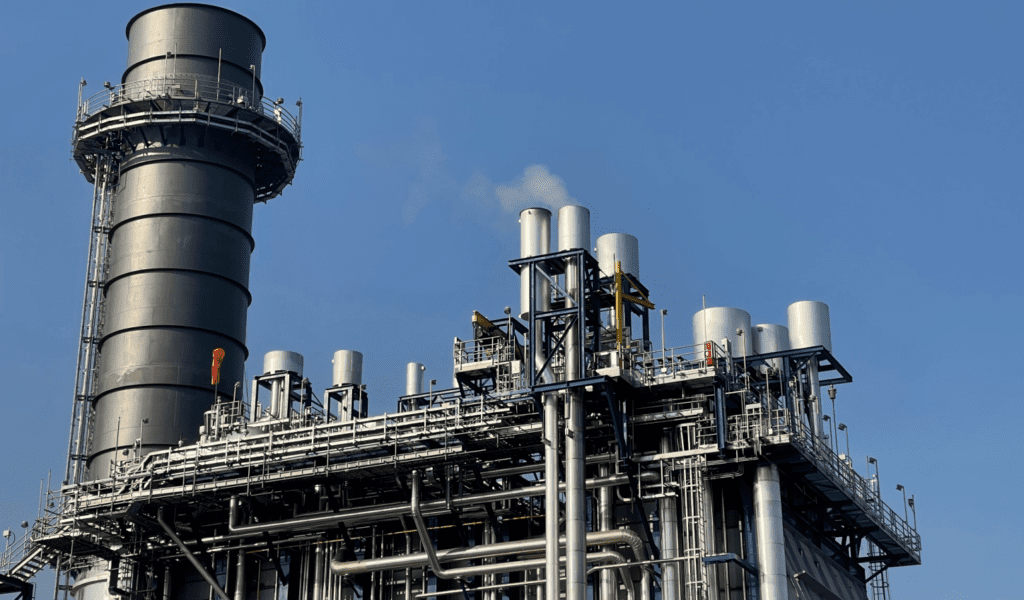A Guide To Achieving A Masters Degree In Maintenance Management.
In today’s competitive industrial landscape, the
reliance on sophisticated and complex machinery has increased the demand for
well-educated maintenance professionals.
The complexity of maintenance and engineering
business processes, combined with higher excellence demands from maintenance
departments, emphasizes the value of advanced education.
Program Overview.
A master’s degree in maintenance management is an
excellent way to advance in this specialized field.
This advanced degree provides a comprehensive
understanding of maintenance best practices, strategies, and tools essential
for maximizing the efficiency and lifespan of industrial assets.
Key Areas of Study.
The program integrates theoretical frameworks with
practical applications, covering:
·
Predictive maintenance.
·
Asset management.
·
Failure analysis.
·
Reliability engineering.
This holistic approach ensures graduates are
well-prepared to tackle complex maintenance challenges across various
industries.
Financial and Operational Focus.
The program emphasizes the financial and
operational impacts of maintenance management, equipping students with:
·
Insights into cost-benefit
analysis.
·
Resource allocation skills.
·
Knowledge of innovative
technologies to streamline maintenance processes.
Career Prospects.
Graduates of this program become invaluable assets
to their organizations, capable of making informed decisions that enhance
operational efficiency.
The degree cultivates leadership and strategic
thinking, preparing graduates to spearhead maintenance initiatives and drive
continuous improvement.
It’s A Long Road But Surely Worthwhile.
Pursuing a Masters in Maintenance Management is
not merely an academic pursuit but a stepping stone to becoming a pivotal
player in the evolving landscape of maintenance management.
Disclaimer:
This article is intended as a guide to help
individuals understand the pathway to earning a Masters in Maintenance
Management.
It is not an official document and should not be
considered as such.
If you are interested in pursuing this level of
education, please research universities or colleges in your region that offer
such programs and establish a learning pathway that suits your needs.
Table
Of Contents:
1.0
Entrance Requirements and Prerequisites for the Masters Program.
1.1 Course Outline for Graduate Diplomas.
2.0
Curriculum Overview.
3.0 Core
Courses in Maintenance Management.
4.0
Project Management Principles.
5.0
Environmental and Safety Management.
6.0
Elective Courses.
7.0
Capstone Project.
8.0
Program Duration and Flexibility.
9.0 Key
Skills Via A Maintenance Management Masters Program.
10.0
Conclusion.
1.0
Entrance Requirements and Prerequisites for the Masters Program.
Embarking on a Masters in Maintenance Management
is a strategic move for professionals aiming to deepen their expertise in
maintaining and managing complex technical systems.
To gain admission into this advanced program,
candidates must meet specific entrance requirements and prerequisites.
1.
Academic
Qualifications: Applicants are generally
required to possess an undergraduate degree in a relevant field such as
engineering, industrial management, or a related discipline.
a.
However, a Graduate Diploma of
Asset and Maintenance Management or a Graduate Diploma of Engineering
Maintenance can also suffice as prerequisite qualifications.
b.
These diplomas provide
foundational knowledge and skills that align well with the advanced topics
covered in the Masters program.
2.
Professional
Experience: In addition to academic credentials,
significant professional experience is often necessary.
a.
Most programs require candidates
to have at least two to three years of relevant industry experience.
b.
This experience ensures that
students can effectively relate theoretical concepts to practical applications
in real-world maintenance scenarios.
3.
Prerequisite
Coursework: Prospective students may need to have
completed specific coursework in areas like statistics, management principles,
or engineering fundamentals. These courses establish a baseline of knowledge
essential for tackling the specialized subjects encountered during the Masters
program.
4.
Admission
Process: The admission process typically involves
submitting a range of documents, including official transcripts, letters of
recommendation from academic or professional mentors, and a statement of
purpose outlining career goals and motivations for pursuing this degree. Some
institutions may also require entrance exams, such as the GRE or GMAT, to
evaluate the applicant’s readiness for graduate-level study.
1.1
Course
Outline for Graduate Diplomas.
1.
Graduate
Diploma of Asset and Maintenance Management:
a.
Asset Management Principles:
Covers lifecycle management, asset performance, and cost analysis.
a.
Maintenance Planning and
Scheduling: Focuses on developing efficient maintenance schedules and resource
allocation.
b.
Condition Monitoring and
Predictive Maintenance: Introduces techniques like vibration analysis and
thermography.
c.
Risk Management and Safety:
Emphasizes hazard identification, risk assessment, and safety protocols.
2.
Graduate
Diploma of Engineering Maintenance:
a.
Engineering Maintenance
Strategies: Explores preventive, corrective, and predictive maintenance
strategies.
b.
Reliability Engineering: Focuses
on reliability theory and failure analysis techniques.
c.
Advanced Maintenance
Technologies: Covers the integration of IoT and data analytics in maintenance.
d.
Project Management for Engineers:
Teaches project planning, execution, and risk management in engineering
contexts.
By meeting these requirements and completing
relevant coursework, prospective students demonstrate their preparedness for
the rigorous academic and practical demands of the Masters in Maintenance
Management program.
2.0
Curriculum Overview.
The Masters in Maintenance Management program
offers a comprehensive curriculum designed to equip students with both
theoretical knowledge and practical skills.
This multidisciplinary approach ensures graduates
emerge as proficient and versatile professionals in the field.
The coursework encompasses diverse subjects,
starting with asset management, where students learn to systematically manage
physical assets throughout their lifecycle, aiming to maximize their value and
efficiency.
This involves understanding the principles of
lifecycle cost analysis and asset performance management, which are crucial for
optimising asset use from acquisition through disposal.
Reliability engineering plays a crucial part in
the curriculum, focusing on the principles and methodologies required to ensure
that systems and components are dependable and perform consistently over time.
This subject highlights various techniques, such
as Failure Modes and Effects Analysis (FMEA) and Root Cause Analysis (RCA),
which are essential for identifying and mitigating potential failures.
Predictive maintenance forms another pillar of the
program, where students are introduced to advanced tools and technologies like
vibration analysis, thermography, and oil analysis.
These methodologies help in predicting equipment
failures before they occur, thereby minimizing downtime and maintenance costs.
Practical training sessions reinforce these
concepts, allowing students to apply their learning in real-world scenarios.
Lean manufacturing is also an integral component, centred
on optimising production processes to reduce waste and improve efficiency.
Students delve into strategies like just-in-time
production, the 5S methodology, and continuous improvement processes to
understand how lean principles can be applied within maintenance management to
streamline operations.
Moreover, the curriculum is designed to ensure
students can design, implement, and manage effective maintenance programs.
Through a blend of theoretical coursework, case studies,
and hands-on projects, participants develop the capability to enhance
operational efficiency and minimize downtime within various organizational
contexts.
This holistic training approach prepares graduates
to meet the challenges of the maintenance management field, making them
valuable assets in any industry.
3.0
Core Courses in Maintenance Management.
The Masters in Maintenance Management program
includes a comprehensive suite of core courses designed to provide students
with a robust foundation in key maintenance and management principles.
These courses ensure that graduates are
well-prepared to tackle the complexities of modern industrial maintenance.
2
Asset
Management: This course covers fundamental principles
of asset management, emphasizing the importance of lifecycle cost analysis and
asset performance management. Students learn how to optimise asset use, from
acquisition through disposal, ensuring cost-effectiveness and enhanced
performance throughout the operational lifecycle.
3
Reliability
Engineering: Reliability engineering is crucial for
reducing system failures and maintaining consistent operations. This course
delves into reliability theory, Failure Modes and Effects Analysis (FMEA), and
Reliability-Centred Maintenance (RCM). Students are trained to identify
potential failures and develop strategies to mitigate these risks effectively.
4
Predictive
Maintenance: In today’s data-driven industry, predictive
maintenance plays a vital role in preventing unexpected downtime. This course
focuses on advanced condition monitoring techniques, including vibration
analysis, thermography, and ultrasonics. Students gain practical expertise in
utilizing these methods to predict and address equipment issues before they
escalate.
5
Lean
Manufacturing: Lean manufacturing principles
are essential for improving efficiency and reducing waste. This course
introduces students to lean principles, Six Sigma methodologies, and continuous
improvement strategies. Through practical applications, students learn how to
implement these techniques to streamline maintenance processes and enhance
productivity.
6
Maintenance
Strategies: Effective maintenance strategies are
critical for ensuring operational reliability and minimizing downtime. This
course explores preventive, corrective, and predictive maintenance strategies,
along with the planning and scheduling of maintenance activities. Students are
equipped with the skills necessary to design and implement comprehensive
maintenance plans tailored to organizational needs.
7
Advanced
Technologies in Maintenance: The integration of
advanced technologies is revolutionizing the maintenance landscape. This course
covers the industrial internet of things (IIoT), artificial intelligence in
maintenance, and data analytics for maintenance. Students learn how to leverage
these technologies to enhance maintenance processes, improve decision-making,
and drive innovation in maintenance management.
Together, these core courses create a robust
educational framework, equipping students with the essential knowledge and
skills needed to excel in the evolving field of maintenance management.
4.0
Project Management Principles.
Project management is a cornerstone of effective
maintenance management, encompassing a broad spectrum of essential skills and
strategic applications.
Within the context of a Masters in Maintenance
Management program, understanding the principles of project planning and
execution is paramount.
1
Project
Planning and Execution: Proper project planning ensures
that all variables, from resource allocation to task scheduling, are
meticulously outlined to achieve desired outcomes.
1.1
Effective execution follows a
well-crafted plan, ensuring that projects are completed within the stipulated
time and budget constraints.
1.2
Students learn to develop
detailed project plans that include defining objectives, allocating resources,
and setting timelines to ensure smooth execution.
2
Risk
Management: Identifying potential risks early and
establishing robust mitigation strategies are vital to safeguarding project
integrity and timeline adherence.
2.1
Students learn to evaluate and
respond to various risk factors, ranging from technical failures to logistical
disruptions, ensuring that maintenance activities proceed smoothly and
efficiently.
2.2
This involves conducting risk
assessments and developing contingency plans to address unforeseen challenges.
3
Budgeting
and Cost Control: Financial acumen is necessary
to develop precise budget forecasts, manage expenditures, and ensure the
financial viability of maintenance projects.
3.1
By mastering these financial
management skills, future maintenance managers can allocate resources
judiciously, preventing cost overruns and optimising economic efficiency.
3.2
Students learn to create and
manage budgets, track expenses, and implement cost-saving measures.
These principles are not only theoretical but are
also applied to real-world scenarios to showcase their practical relevance.
For instance, in a case study involving an
industrial maintenance project, project managers might employ project
management software to plan and monitor all project phases, from initial risk
assessment to final cost analysis.
Such tools facilitate efficient project tracking,
allowing managers to anticipate issues and adjust plans proactively, thereby ensuring
successful project outcomes.
In essence, mastering project management
principles equips maintenance management professionals with the necessary
skills to navigate the complexities and dynamic challenges of the maintenance
environment.
These competencies are indispensable for driving
operational efficiency, enhancing reliability, and ultimately contributing to
the sustained success and safety of any organization.
5.0
Environmental and Safety Management.
Environmental and safety management are critical components
of a Masters in Maintenance Management program.
Students enrolled in this program gain a
comprehensive understanding of the environmental regulations and compliance
requirements that govern industrial operations.
This foundational knowledge is essential to ensure
that facilities adhere to legal standards and minimize adverse environmental
impacts.
An integral part of the curriculum includes the
study of safety management systems. These systems are designed to create safe
work environments and mitigate risks associated with industrial processes.
By learning to design and implement these systems,
students promote not only compliance with health and safety regulations but
also the overall well-being of employees.
Effective safety management systems encompass a
range of practices, from hazard identification and risk assessments to
emergency response planning and incident investigation.
Risk assessment and mitigation are also focal
points within the realm of environmental and safety management.
Understanding the principles of risk management
allows future maintenance managers to identify potential hazards and evaluate
the associated risks before they become issues.
This proactive approach is vital in preventing
accidents and ensuring the sustainability of operations.
Through comprehensive risk assessment, students
can develop strategies to control or eliminate risks, safeguarding both
personnel and the environment.
Overall, the in-depth exploration of environmental
and safety management equips students with the knowledge necessary to maintain
safe and sustainable operations in various industrial settings.
Mastery of these subjects ensures that maintenance
managers can effectively navigate the complex regulatory landscape, foster a
culture of safety, and contribute to the long-term viability of their
organizations.
The emphasis on these themes underscores their
importance in achieving operational excellence and sustainability in
maintenance management.
6.0
Elective Courses.
The Masters in Maintenance Management program
offers a diverse range of elective courses, allowing students to tailor their
education to align with their specific career goals and personal interests.
These electives are integral in providing a
specialized skill set that complements the core curriculum, ensuring graduates
are well-equipped to meet the multifaceted demands of the industry.
1
Energy
Management: This elective focuses on the principles of
energy efficiency within industrial systems.
1.1
Students explore strategies to
minimize energy wastage and maximize operational efficiency, delving into
renewable energy technologies and sustainable practices.
1.2
The course also covers energy
audits, providing students with the expertise to evaluate and enhance energy
use within an organization.
2
Human
Factors in Maintenance: This course addresses the
importance of ergonomics and human factors in maintaining a healthy and
effective workforce.
2.1
It focuses on designing work
environments to optimise human performance and reduce the risk of injury.
2.2
Students also learn about
workforce training and development, including strategies for continuous
improvement and skill enhancement among employees.
2.3
Leadership and team management
components prepare students to lead teams effectively and foster a
collaborative work environment.
3
Quality
Management: Essential for those aiming to excel in
quality assurance, this course covers various aspects of quality control,
including tools and techniques to ensure product and service excellence.
3.1
It emphasizes the principles of
Total Quality Management (TQM), a holistic approach to long-term success
through customer satisfaction.
3.2
Students become familiar with ISO
standards and certifications, understanding their importance in maintaining
industry benchmarks and compliance.
These elective courses provide students with the
flexibility to focus on areas that align with their career aspirations and
interests in the field of maintenance management.
This customized approach ensures they are not only
well-versed in the core aspects of the program but also possess specialized
knowledge that enhances their professional capabilities.
7.0
Capstone Project.
The capstone project serves as the culmination of
the Masters in Maintenance Management program, providing students with a vital
opportunity to integrate theoretical knowledge with practical application.
This project is designed to address real-world
maintenance challenges, allowing students to bridge the gap between academic
concepts and industry practices.
1
Project
Selection and Relevance: Students begin by selecting a
project topic that aligns with their career interests and the needs of their
current or prospective employers.
1.1
This ensures that the project is
both relevant and beneficial to their professional growth.
1.2
Topics can range from optimising
maintenance schedules and procedures to incorporating advanced technologies
like predictive maintenance or IoT (Internet of Things) solutions into existing
systems.
2
Research
and Development: Once the topic is selected,
students engage in extensive research and data collection.
2.1
This stage involves collaborating
with industry experts, consulting academic resources, and potentially
conducting field studies.
2.2
The data gathered guides the
development of innovative maintenance solutions tailored to address the identified
challenges.
3
Implementation
and Testing: Students then implement their proposed
solutions in a controlled or real-world environment, followed by thorough
testing and analysis to evaluate effectiveness and feasibility.
3.1
This dynamic process closely mimics
real-world conditions, providing invaluable hands-on experience and practical
insights.
4
Presentation
and Evaluation: Upon completion, students
compile their findings and recommendations into a detailed report and prepare
for a formal presentation.
4.1
These presentations are typically
assessed by a panel of faculty members and industry professionals, evaluating
the students’ ability to articulate their processes, defend their solutions,
and demonstrate the practical application of their theoretical knowledge.
The capstone project is not only a testament to
the students’ learning journey but also a pivotal experience that equips them
with the confidence and competence to excel in the field of maintenance
management.
Through this meticulous and practical approach,
students transition from being learners to becoming contributors and leaders in
their professional realm.
8.0
Program Duration and Flexibility.
The pathway to earning a Masters in Maintenance
Management is typically structured to span three years, offering considerable
flexibility to accommodate the diverse needs of students.
This flexibility is a key feature of the program,
allowing individuals to tailor their educational journey according to their
personal and professional circumstances.
1
Full-Time
vs. Part-Time Enrolment: Students have the option to enrol
on either a full-time or part-time basis.
1.1
Full-time students generally
complete the program within two to three years, benefiting from an immersive
educational experience that allows them to focus intensively on their studies.
1.2
Conversely, part-time students,
who may be balancing professional responsibilities alongside their academic
pursuits, can extend the program over four to five years.
1.3
This option is particularly
advantageous for working professionals, enabling them to integrate their
learning with practical experience in their current roles.
2
Course
Delivery Options: The program is designed with a
blend of online and on-campus courses, providing students with the flexibility
to manage their schedules effectively.
2.1
Many courses are offered during
evenings or weekends, catering to those with demanding work commitments.
2.2
This hybrid model ensures that
students can engage with the curriculum without compromising their professional
obligations.
3
Credit
Transfers and Prior Learning Assessments: Some
universities offer opportunities for credit transfers and recognize prior
learning experiences, which can potentially reduce the time required to
complete the program.
3.1
This recognition of previous
academic and professional achievements allows students to progress through the
program more efficiently.
Overall, the program’s duration and flexibility
are tailored to support the varied needs of its participants.
Whether through a full-time commitment or a
part-time engagement, the Masters in Maintenance Management program ensures
that students can effectively balance their professional aspirations with their
educational pursuits, ultimately fostering a seamless integration of theory and
practice in their career advancements.
9.0
Key Skills Via A Maintenance Management Masters Program.
A Masters in Maintenance Management is designed to
equip students with a comprehensive set of skills essential for excelling in
the field.
Throughout the program, students engage in
coursework and practical experiences that enhance both technical and soft
skills, preparing them for the multifaceted demands of maintenance management.
1
Technical
Skills: The program emphasizes a deep understanding of
maintenance techniques and modern technologies.
1.1
Students master predictive
maintenance, condition monitoring, and reliability engineering, which are
crucial for maintaining operational efficiency across various industries.
1.2
The curriculum also covers
advanced topics such as asset management, the integration of the Internet of
Things (IoT) in maintenance, and the use of data analytics for informed
maintenance decision-making.
2
Soft
Skills (Personal Attributes): Alongside technical
expertise, the program focuses on developing essential soft skills.
2.1
Leadership skills are cultivated
through courses on organizational behaviour, team dynamics, and strategic
planning, preparing students to lead maintenance teams effectively and drive
productivity and safety initiatives.
2.2
Problem-solving is another
critical skill, with case studies and scenarios challenging students to think
critically and devise innovative solutions.
3
Project
Management Skills: The ability to plan, execute,
and oversee maintenance projects is a key focus.
3.1
Students learn to ensure projects
are completed on time, within budget, and meet quality standards.
3.2
This involves mastering aspects
of project management such as resource allocation, risk management, and cost
control.
4
Practical
Experience: Practical experience is integral to the
program, often facilitated through internships, workshops, and industry
collaborations.
4.1
These hands-on opportunities
allow students to apply theoretical knowledge to real-world situations, further
solidifying their expertise and preparing them for the complexities of the
maintenance management landscape.
Overall, the Masters in Maintenance Management
cultivates a well-rounded skill set, blending technical know-how with essential
soft skills.
This holistic approach ensures that graduates are
well-prepared to tackle the challenges of maintenance management and drive
continuous improvement in their organizations.
10.0
Conclusion.
Earning a Masters in Maintenance Management is a
strategic investment for individuals aspiring to excel in the field of
maintenance and asset management.
This comprehensive program equips students with a
blend of technical and managerial skills, preparing them to tackle the complex
challenges of modern industrial environments.
Through a well-rounded curriculum that includes
core courses, elective options, and practical experiences, graduates are
well-prepared to drive operational efficiency and innovation in their organizations.
The program’s emphasis on project management,
environmental and safety management, and emerging technologies ensures that
students are not only adept at maintaining current systems but are also capable
of leading advancements in maintenance strategies.
The flexibility of the program, with options for
full-time and part-time enrolment, allows professionals to balance their
education with ongoing career commitments, further enhancing their ability to
apply new knowledge directly to their work environments.
Graduates of this program find themselves in high
demand across various industries, with career opportunities ranging from
maintenance management and reliability engineering to senior leadership roles.
As industries continue to evolve, the skills
acquired through a Masters in Maintenance Management will remain invaluable,
enabling professionals to contribute significantly to their organizations’
success and sustainability.
Pursuing a Masters in Maintenance Management
provides a robust foundation for a fulfilling and impactful career, positioning
graduates as leaders in the ever-evolving landscape of maintenance and asset
management.








